PSHE (Including RSHE)
PSHE (Including RSHE) Curriculum


Relationship Education became statutory for all primary schools from September 2020. At St Mary's we use The Life to the Full Plus programme. This programme is based on ‘A Model Catholic RSHE Curriculum’ by the Catholic Education Service which was highlighted as a work of good practice by the Department of Education. Therefore, we have confidence that the programme will be fit for purpose in supporting the growth and development of your child.
Life to the Full Plus is much more than a series of lessons. It is an entire platform of creative resources that will engage, inform and inspire our children and, indeed, you as parents. This includes interactive video content, story-based activities, employing a wide range of teaching tools, original worship music and an accompanying programme of classroom prayers.
Intent
' I have come so you may live life to the full.' John 10:10
At St. Mary’s, we believe that PSHE/RSHE are intertwined subjects which should be taught alongside one another. This approach ensures children and young people are equipped with the knowledge, understanding, skills and confidence to cope with the many pressures and challenges of modern society. Learning about friendships and family in both PSHE and RSHE are the building blocks to help children to understand themselves and others. Children are prepared for the physical and emotional changes they undergo at puberty. PSHE and RSHE should equip children and young people with the information, skills and positive values to have safe, fulfilling relationships. It provides a positive view of human sexuality and dignity of the human person; equips young people with the ability to make practical judgements about the right thing to do in particular circumstances and explores and promotes virtues which are essential to promoting respect and dignity. All of this is done within the doctrine of the Catholic Church, faithful to the Church's vision of human wholeness whilst recognising the contemporary context in which we live today. With the support of Pope Francis we believe that everyone has “the right to be part of the family. They're children of God ... Nobody should be thrown out, or be made miserable because of it.”
We use the resources, shown below, to support us in our work with children.
Implementation
RSHE is taught as explicit lessons through the PSHE and science curriculums but is also embedded in other areas of the curriculum and day-to-day life of the school. For example, PSHE/RSHE is specifically covered in the units ‘in science such as ‘Animals Including Humans’ and ‘Living Things and Their Habitats’ also covering the statutory requirements; other elements are also covered in the Religious Education curriculum.
Children are taught by familiar adults who they have a good rapport with, in order to facilitate constructive and supportive discussions around sensitive topics in a safe and secure environment. Staff have received in-house and online CPD (via Ten:Ten) to support them in responding to the needs of the individual child and support children with any questions or concerns they may have. If staff feel uncomfortable or unsure when delivering the PSHE/RSHE curriculum or dealing with individual pupil needs, they know where to seek advice and support. The PSHE/RSHE curriculum has been mapped out clearly to ensure coverage of all of the statutory elements by the end of the primary phase; these are delivered at the appropriate stage for our children and is supported specifically by a very thorough, spiral programme of learning from Ten:Ten - Life to the Full Plus. Life to the Full Plus covers all of the statutory elements of RSHE and more.
Our high expectations of behaviour, interpersonal relationships, respect and tolerance of others reflect the British Values upheld in both our community and the wider world. Through our rigorous and progressive curriculum, children develop key skills and are prepared for the wider world beyond primary school, a world in which they can keep themselves safe and healthy and thrive with the support of the positive relationships they forge with those around them.
PSHE and RSHE is taught in three modules across the primary school, from EYFS to UKS2:
Module 1: Created and Loved by God
Module 2: Created to Love Others
Module 3: Created to Live in Community
Impact
The impact of our curriculum will be that the standards of attainment across the school will meet or exceed those which are expected of our children nationally. We continuously assess the implementation and impact of our PSHE and RSHE curriculum in order to achieve the highest outcomes possible across all year groups and ensure we provide the support that is necessary for all children to have a good understanding of the complexities of relationships and how they grow and change and a secure knowledge and skills base to navigate their way through these, now and in the future. Through our PSHE/RSHE curriculum, we believe we can enhance children’s education and help them to become confident individuals who have positive body awareness, in-depth knowledge of how to keep themselves safe and healthy and who will, through respect, tolerance and understanding, forge and maintain positive relationships with a diverse range of family and friendship groups.
Parent Portal Ten:Ten
As a school, we believe that the partnership between home, school and church is crucial in delivering a meaningful and enriching RSHE curriculum. Ten:Ten Life to the Full provides a programme that aligns with the statutory Relationship and Health Education guidance which is rooted in a Christian understanding of the human person.
To support and enrich this partnership further, Ten:Ten Life to the full has provided an online parent platform so that you, as parent and carers, can engage with the teaching of RSHE and deepen the experience for your child. To access the online parent platform please visit: www.tentenresources.co.uk/parent-portal
The username and password has been sent to you through Parentmail.
If you have any queries regarding the teaching of RSE, please speak to your class teacher or, alternatively, Miss Southgate, the RSE lead.
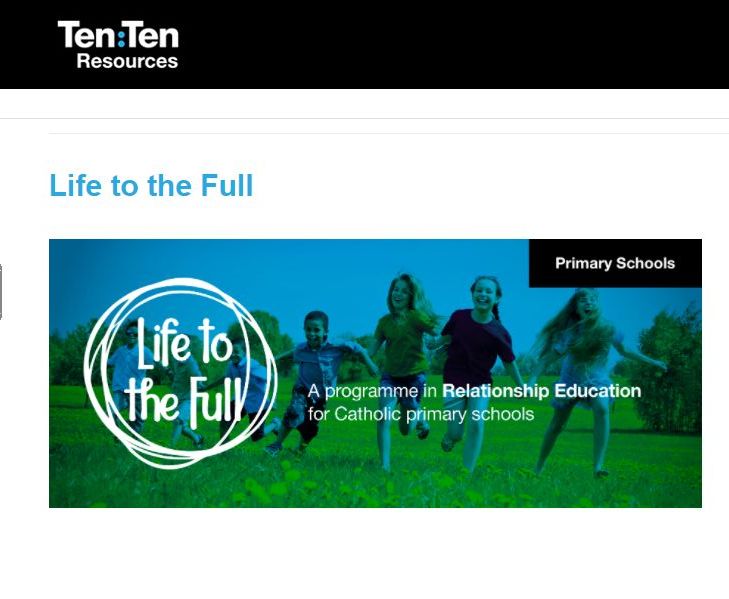
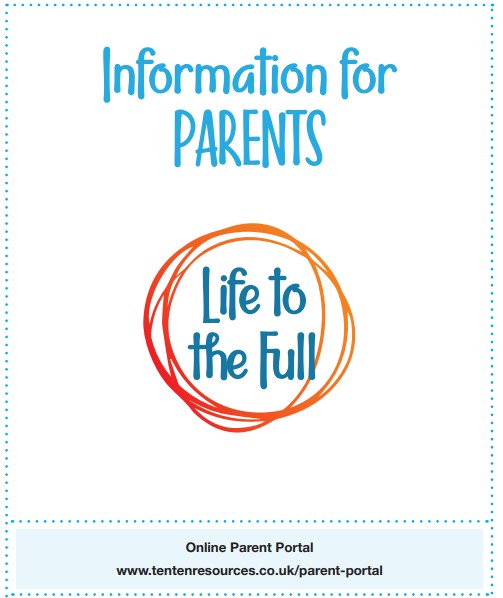
Parents Consultation:
We have currently opened a consultation period until January. Please refer to the email you have been sent to access resources that have been shared, and use the QR code to complete a survey to share your thoughts. We value your responses and will use these to adapt and inform our practice as deemed necessary, including providing further support and explanations as needed. Many thanks for your continued support.
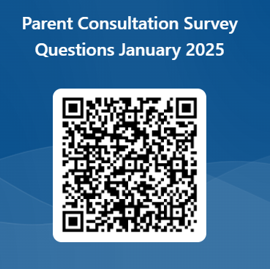
https://forms.office.com/e/mMik8bnfYf
Programme Content
The programme adopts a spiral curriculum approach so that as your child goes through the programme year-after-year, the learning will develop and grow, with each stage building on the last.
Module One: Created and Loved by God
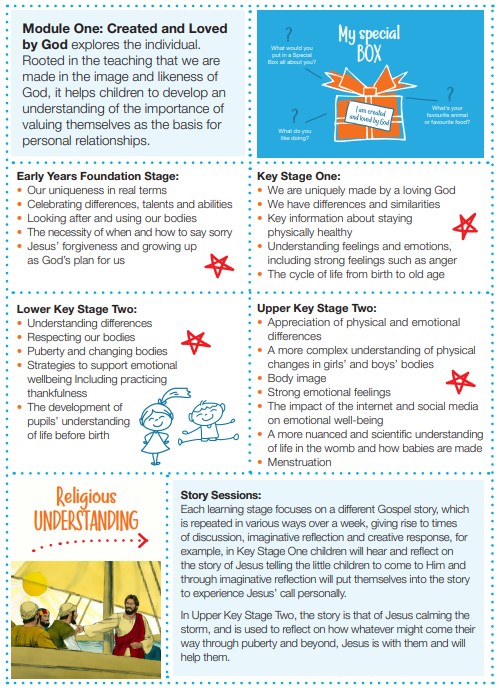
Module One: Created and Loved by God explores the individual. Rooted in the teaching that we are made in the image and likeness of God, it helps children to develop an understanding of the importance of valuing themselves as the basis for personal relationships.
In these sessions, we explore:
Key Stage One – that we are uniquely made by a loving God, that we have differences and similarities (including physical differences between boys and girls), key information about staying physically healthy, understanding feelings and emotions, including strong feelings such as anger, and the cycle of life from birth to old age.
Lower Key Stage Two – understanding differences, respecting our bodies, puberty and changing bodies (recommended for Year 4+), strategies to support emotional wellbeing including practicing thankfulness, and the development of pupils' understanding of life before birth.
Upper Key Stage Two – appreciation of physical and emotional differences, a more complex understanding of physical changes in girl and boys' bodies, body image, strong emotional feelings, the impact of the internet and social media on emotional well-being, a more nuanced and scientific understanding of life in the womb and how babies are made, and menstruation.
Module Two: Created to Love Others
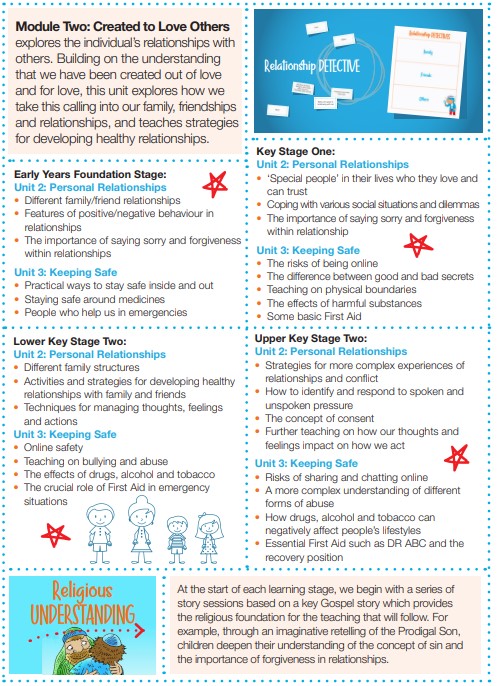
Module Two: Created to Love Others explores the individual’s relationship with others. Building on the understanding that we have been created out of love and for love, this unit explores how we take this calling into our family, friendships and relationships, and teaches strategies for developing healthy relationships and keeping safe.
This religious understanding is then applied to real-world situations relevant to the age and stage of the children:
Key Stage One – In the Unit ‘Personal Relationships’, children are taught to identify the Special People in their lives who they love and can trust, how to cope with various social situations and dilemmas, and the importance of saying sorry and forgiveness within relationships. In the Unit ‘Keeping Safe’, we explore the risks of being online by incorporating the ‘Smartie the Penguin’ resources from Childnet, the difference between good and bad secrets, and teaching on physical boundaries (incorporating the PANTS resource the NSPCC).
Lower Key Stage Two – The sessions here help children to develop a more complex appreciation of different family structures and there are activities and strategies to help them develop healthy relationships with family and friends; here, they are also taught simplified Cognitive Behavioural Therapy (CBT) techniques for managing thoughts, feelings and actions.
Once again, for the ‘Keeping Safe’ unit, there are some excellent NSPCC resources, as well as teaching on bullying and abuse through a series of animated stories.
Upper Key Stage Two – The sessions for UKS2 in the ‘Personal Relationships’ module aim to equip children with strategies for more complex experiences of relationships and conflict; this includes sessions that help children to identify and understand how to respond to spoken and unspoken pressure, the concept of consent and some practical demonstrations of this, and further teaching on how our thoughts and feelings have an impact on how we act.
Module Three: Created to Live in Community
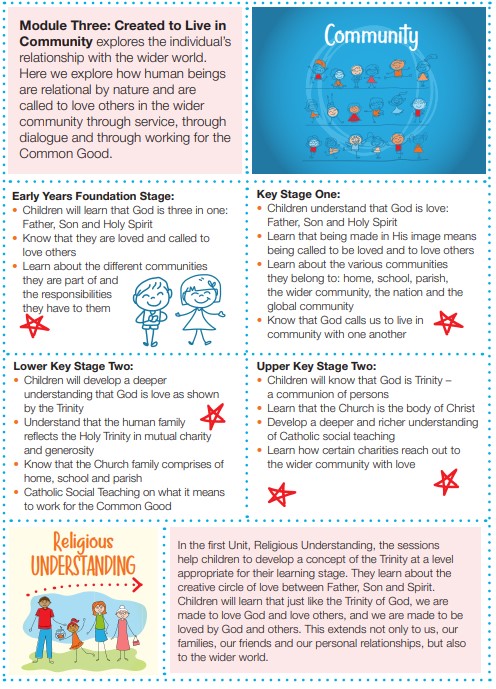
Finally, Module Three: Created to Live in Community explores the individual’s relationship with the wider world. Here we explore how human beings are relational by nature and are called to love others in the wider community through service, through dialogue and through working for the Common Good.
In the first Unit, Religious Understanding, the story sessions help children to develop a concept of the Trinity.
In subsequent sessions, we apply this religious understanding to real-world situations, such as the community we live in, and through exploring the work of charities which work for the Common Good.
